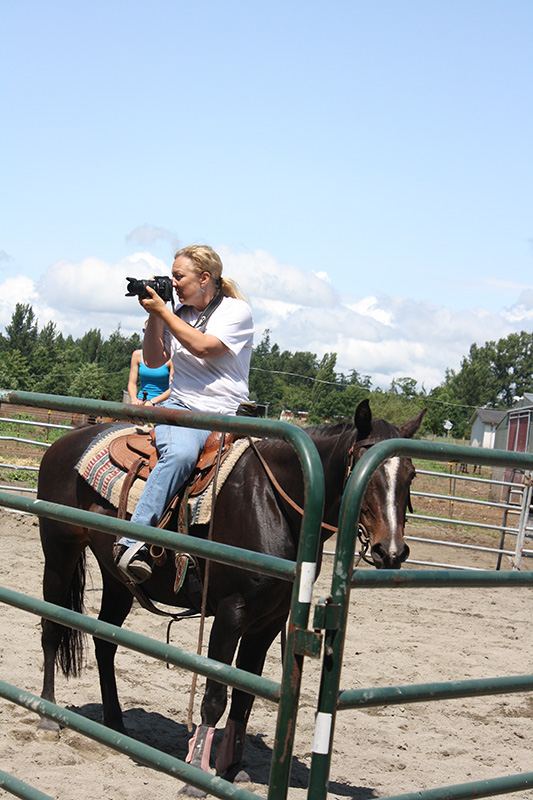What You Need to Know to Achieve Success in the Horse Industry
by Allison Trimble

Confucius says: “Find a job that you love and you will never work a day in your life.” I call this false advertising—perhaps the worst I’ve heard! That idea has sent countless horse lovers skipping towards the horse industry with fantasies of blue ribbon success. The reality, I’ve personally discovered, is significantly grittier. Of all horse related subjects, I feel most qualified to speak on this topic. And in the spirit of celebrating 20 years of the NWHS, it is fitting to discuss the journey of making a passion a profession. Here are a few things to consider, beyond the dream of grooming pretty ponies with a full heart.
The pay is terrible. There is a popular saying regarding the horse industry: “If you want to make a million dollars, start with two million.” The truth is that the vast majority of equine related professions are poor business models. The expense of horse ownership is high and unpredictable. This affects horse trainers, certainly, but it also affects other client based horse industry professions. Luxury items, such as a horse, are one of the first things to go when the economic situation of a client changes. Changes in even one factor, such as fuel prices, have far reaching effects on the entire economics of the industry. There were many years that I was literally paying to be an “equine professional.”
The hours are long and the work is hard. When the subject is a 1,000 pound animal that requires incredible time, effort and expense, this hard work applies whether you are a trainer, farrier or veterinarian. You must also combine the specific trade requirements/challenges with all the unexpected “treats” horses bestow: colic, lameness, foaling season, farm maintenance, etc. For every laborer hired to make things easier you also take a gamble; they might ease the work load but can also add additional costs due to mistakes and misuse. Most professionals are in the position of making it a business because they have a drive to match their dream. It is rare to find an employee that has the same type of crazy devotion and attention to detail. The added cost and stress of hired help often leaves the professional burning the candle at both ends.
It is said it takes 10,000 hours to become an expert on a topic so another thing to consider before hanging out a shingle is that many equine professions require schooling and certification. While anyone can advertise themselves as a “trainer,” don’t be the person who takes on clients without paying the price of experience. This includes years of on-the-job training to become proficient.
Paying with your heart. The disappointments, and there will be many, have a significant personal impact when the topic is close to your heart. No business is without failure, low points and (especially in the horse industry) critics. It is incredibly hard to avoid taking everything personally, particularly because one trait of a true horseman is to take responsibility—for everything.
A good horseperson, in any professional capacity, will also have a deep interest in the wellbeing of the horse. Many times the financial implications involved work against what is best for the horse. Even more often, what is best for the horse is not what is best for the human and the professional’s ego is challenged. I have said many times that success in the horse industry requires love of horses and a healthy ego to make a go of it. In the individual horseperson those traits will not exist in equal measure.
The stress. It can be overwhelming. I had no trouble coming up with a laundry list of cautionary tales, warnings and negatives about becoming an equine professional for this article. So, why would anyone attempt it? For some people, a little horse blood seems to run in their veins. For them the work and the challenge is just part of the journey and it sweetens success when it comes. The draw to horses is sometimes stronger than all the potential negative scenarios.
In my experience, the people who last in a horse related business have this intangible combination of factors that keep them going against tough odds. This is what makes the magazine and Karen Pickering so special. Born of Karen’s love for horses and people, the NWHS has blossomed through intense effort and determination. I have been fortunate to know Karen well in several capacities for many years: As her trainer, I found her focused and hard working; as a columnist and a reader I believe in what this magazine offers the community and as an advertiser I’ve found Karen goes above and beyond to put her client’s needs first. Simply, I feel lucky to know someone so kind and inspiring and call her a friend. I cannot think of an equine professional that I respect more.
Published in December 2015 Issue

Allison Trimble is a Realtor® specializing in equestrian properties, farm and ranch properties, and residential real estate. As a former horse trainer, and a current owner, breeder and non-pro competitor in cow horse and reining events, she combines her experience in the horse industry with her lifelong real estate expertise to guide her clients through the real estate process.
Learn more at www.coastalrealtywa.com

